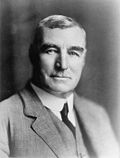Economic
During the election campaign, Ward startled both his supporters and his audience by promising to borrow £70 million in a year to revive the economy; while this is believed to have been a mistake caused by Ward's failing eyesight, or was intended to be £70 million over eight to ten years, borrowed at £6 to £8 million per year (possibly a sympathetic amendment by the newspaper), [2] : 100–101 it was popular with the electorate. Labour lost two urban seats: Auckland East (John A. Lee) and Grey Lynn (Fred Bartram), and many town workers and unionists must have heard "the musical chink of the seventy million". ... More by accident than design United seems to have manage to recreate to some extent the old Liberal combination of urban worker and rural support. In the circumstances it was ephemeral. [2] : 103
Chapman says that it is now clear that Ward inadvertently substituted 'seventy' for 'seven' when reading out the amount he would borrow in the first twelve months, and the correction to seventy millions spread over ten or eight years actually represented a shade less than Reform had already raised. But Reform's tactic of emphasising the larger amount backfired as many voters did not share Reform's financial orthodoxy. Ward amended the loan scheme in his final address in Dunedin to raise the sixty million portion for settlers by issuing bonds over the counter like packets of tea, and said that United would vote with Labour to oust the (Reform) Government. The resulting three-party vote astounded everyone, and was similar to 1919. [3]


